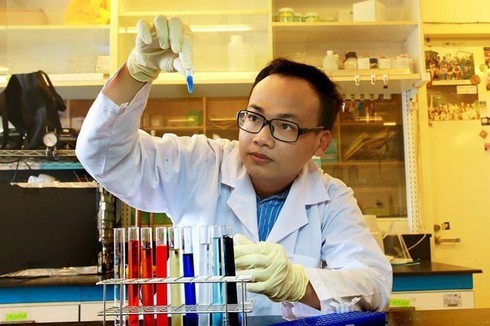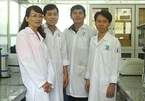Having a high number of scientific articles published in prestigious international journals with high citation indexes, Hai is one of 10 young talents in the field of science and technology selected to be honored with the 2019 Golden Ball Award.

Tran Nguyen Hai
Graduating from Can Tho University majoring in land management in 2003, Hai continued studying soil science for a master’s degree. Later, he received a doctorate in environmental engineering from Chung Yuan Christian University, Taiwan in 2017.
At present, Hai works for the Research Institute for Basic and Applied Sciences in HCM City, an arm of Duy Tan University in Da Nang.
Since 2015, he has had 50 scientific research works published on Web of Science’s prestigious international journals, of which 29 articles belong to Q1 list, nine belong to Q2, 10 to Q3 and 2 to ESCI.
|
Having a high number of scientific articles published in prestigious international journals with high citation indexes, Hai is one of 10 young talents in the field of science and technology selected to be honored with the 2019 Golden Ball Award. |
He is the main author of one scientific report which received award for excellent report.
He was a key member of the research team implementing the project on applying a new decentralized arsenic treatment system for drinking water in rural Vietnam. The project is funded by the Australian Department of Foreign Affairs and Trade, and Google.
The scientific work was published in the ISI journal - Science of The Total Environment - with high prestige in the environment.
According to the Ministry of Health, in Vietnam, 17 million people use underground water contaminated with arsenic. Regular use and exposure to arsenic-contaminated water leads to many potential health risks, especially cancer.
Therefore, the main objective of the project is to develop technology for treating arsenic toxins in underground water, suitable to households and local public works such as schools and clinics.
From more than 30 filter materials selected for laboratory testing, the research team has developed a new filtration system that is compatible with locally available materials. The water indicators after going through filtration meets quality standards.
He was also the leader of the research team implementing the project on synthetizing advanced materials for treatment of polluted water funded by the National Foundation for Science and Technology (NAFOSTED).
Hai is a member of the editorial board of 12 ISI/Scopus journals, including Science of the Total Environment; Current Pollution Reports; Environment, Development and Sustainability; Bulletin of Environmental Contamination and Toxicology; and Water Science and Technology.
When he was a postgraduate student, Hai wrote an article on important errors in his research area of water treatment with adsorption technology. This article is among the most cited by the international community.
Le Huyen

Vietnamese scientists develop new uses for bee venom
This is the first time a study on anti-inflammatory and analgesic effects of bee venom (apis mellifera) on experimental animals has been carried out in Vietnam.

3,000 Vietnamese scientists produced only 20 research works in 2019
The number of scientists working at research institutes is high, but the volume of research work is modest.
 Dr Tran Nguyen Hai, 35, from Duy Tan University, is a member of the editorial board of 12 prestigious international science journals.
Dr Tran Nguyen Hai, 35, from Duy Tan University, is a member of the editorial board of 12 prestigious international science journals.